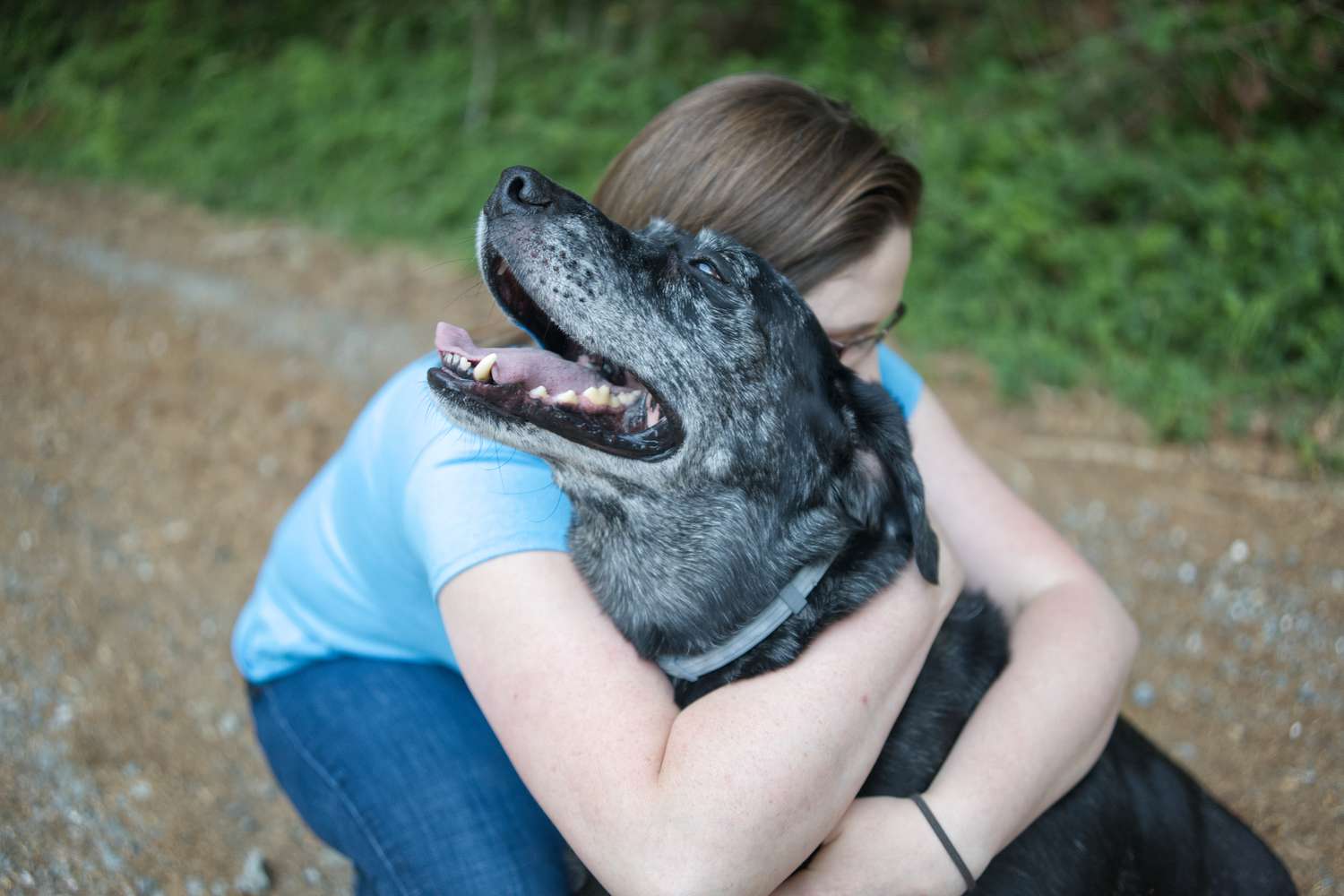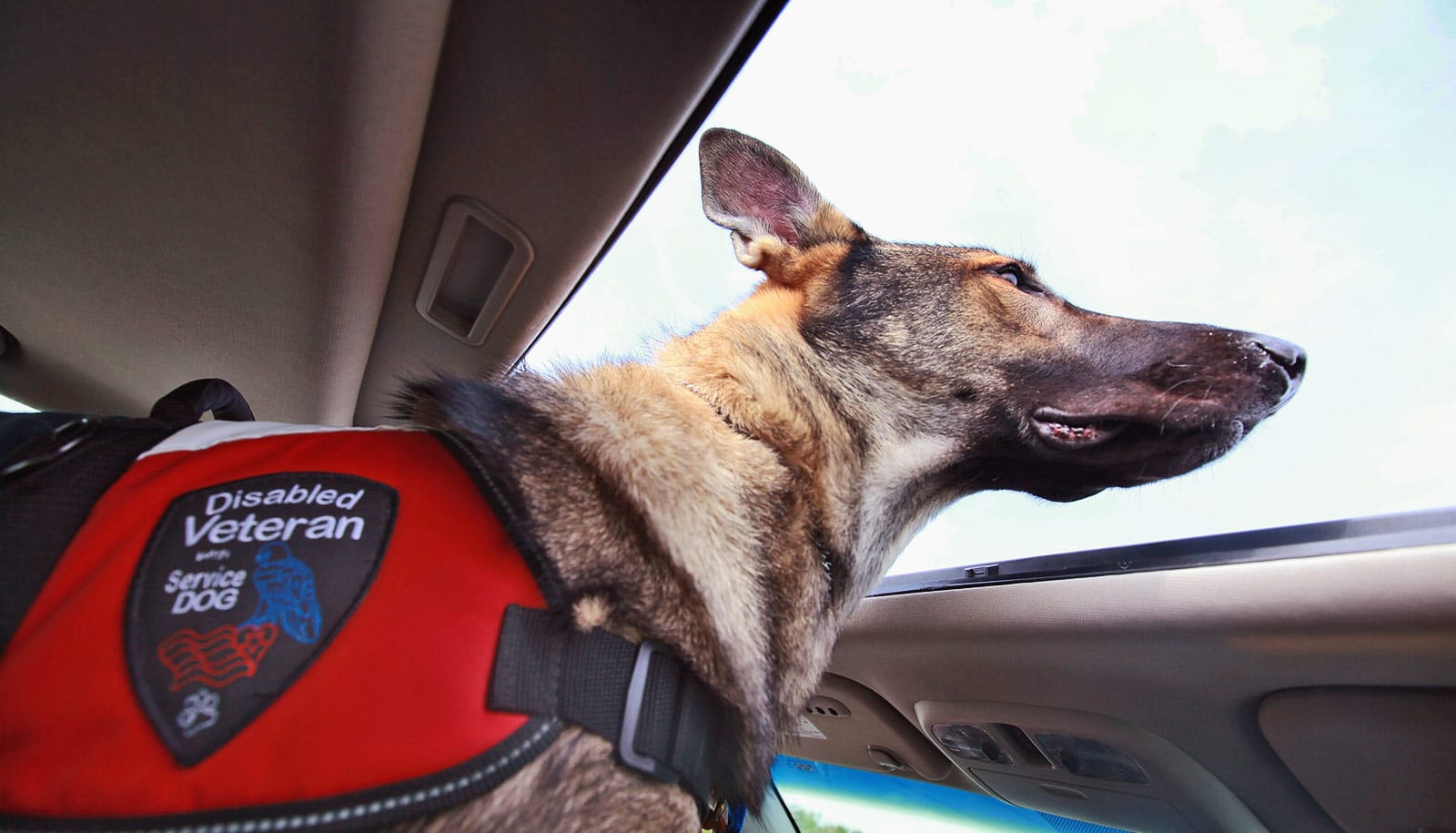Home>Health & Wellness>Behavior & Cognitive Care>How Does Trazodone Affect Dogs When Taken For Anxiety


Behavior & Cognitive Care
How Does Trazodone Affect Dogs When Taken For Anxiety
Published: January 29, 2024
Learn how Trazodone affects dogs when used for anxiety, and its impact on behavior and cognitive care. Understand the potential effects and considerations for your pet's well-being.
(Many of the links in this article redirect to a specific reviewed product. Your purchase of these products through affiliate links helps to generate commission for Pawsomeoldies.com, at no extra cost. Learn more)
Table of Contents
Introduction
When it comes to the well-being of our furry companions, ensuring their mental and emotional health is just as crucial as addressing their physical needs. Dogs, like humans, can experience anxiety and stress, which can significantly impact their quality of life. Fortunately, advancements in veterinary medicine have led to the development of various treatment options to support dogs facing anxiety-related challenges.
One such option that has gained attention in the field of veterinary behavioral care is the use of Trazodone. This medication, originally developed for human use, has shown promise in alleviating anxiety and promoting a sense of calm in dogs. As a pet parent, understanding the implications of using Trazodone for anxiety in dogs is essential for making informed decisions about your pet's care.
In this comprehensive guide, we will delve into the intricacies of Trazodone as a treatment for anxiety in dogs. From its mechanism of action to potential side effects and proper administration, we aim to provide a holistic understanding of how Trazodone can impact our canine companions. By shedding light on this topic, we hope to empower pet owners and caregivers with the knowledge needed to navigate their dog's behavioral well-being with confidence and compassion.
Read more: How Does A Heartworm Affect Dogs
What is Trazodone?
Trazodone is a medication that belongs to the class of drugs known as serotonin antagonist and reuptake inhibitors (SARIs). Initially developed as an antidepressant for human use, Trazodone has garnered attention in veterinary medicine for its potential to address behavioral issues in dogs, including anxiety.
The primary mechanism of Trazodone involves modulating the levels of serotonin in the brain. Serotonin, often referred to as the "feel-good" neurotransmitter, plays a crucial role in regulating mood, anxiety, and stress. By inhibiting the reuptake of serotonin and antagonizing certain serotonin receptors, Trazodone helps increase the availability of serotonin in the brain, thereby promoting a calming effect.
In the context of canine behavioral care, Trazodone is prescribed off-label, meaning it is used in a manner not specified on the approved drug label. Veterinarians may recommend Trazodone to manage anxiety-related issues in dogs, such as separation anxiety, noise phobias, or generalized anxiety disorders. It is important to note that the use of Trazodone should always be under the guidance and supervision of a qualified veterinarian, as they can determine the appropriate dosage and administration based on the individual needs of the dog.
When administered as part of a comprehensive behavioral management plan, Trazodone can aid in reducing anxiety levels and promoting a sense of relaxation in dogs. Its potential to mitigate anxiety-related behaviors makes it a valuable tool in addressing the emotional well-being of our canine companions.
In summary, Trazodone is a medication with a multifaceted pharmacological profile that extends beyond its original antidepressant properties. Its ability to modulate serotonin levels in the brain positions it as a viable option for managing anxiety in dogs, offering a ray of hope for pet owners seeking to support their furry friends through behavioral challenges.
Trazodone for Anxiety in Dogs
Trazodone has emerged as a valuable tool in the realm of veterinary behavioral care, offering a potential solution for addressing anxiety in dogs. Canine anxiety can manifest in various forms, including separation anxiety, noise phobias, and generalized anxiety disorders, all of which can significantly impact a dog's well-being. Recognizing the distress that anxiety can cause in our furry companions, veterinarians have turned to Trazodone as a means of providing relief and promoting a sense of calm.
When used for anxiety in dogs, Trazodone works by targeting the underlying neurochemical imbalances that contribute to anxious behaviors. By modulating serotonin levels in the brain, Trazodone helps regulate mood and emotional responses, thereby mitigating the symptoms of anxiety. This pharmacological action can lead to a reduction in anxious behaviors, allowing dogs to experience a greater sense of tranquility and comfort in stressful situations.
One of the key advantages of using Trazodone for anxiety in dogs is its versatility. Whether a dog exhibits anxiety during thunderstorms, fireworks, car rides, or periods of separation, Trazodone can offer a tailored approach to managing their specific triggers. This adaptability underscores the potential of Trazodone to address a wide spectrum of anxiety-related challenges, providing a comprehensive solution for supporting the behavioral well-being of dogs.
Moreover, Trazodone's relatively rapid onset of action makes it particularly valuable in acute anxiety management. When administered as directed by a veterinarian, Trazodone can help alleviate acute episodes of anxiety, offering timely relief to dogs in distress. This aspect is especially beneficial for pet owners seeking immediate support for their dogs during anxiety-inducing events or transitions.
In the context of a holistic behavioral management plan, Trazodone can serve as a valuable adjunct to behavior modification techniques and environmental adaptations. By incorporating Trazodone into a comprehensive approach to anxiety management, veterinarians and pet owners can work towards addressing the root causes of anxiety while simultaneously providing symptomatic relief to enhance the dog's overall well-being.
In essence, Trazodone's role in addressing anxiety in dogs extends beyond mere symptom management; it aims to foster a sense of emotional balance and resilience in our canine companions. By leveraging the potential of Trazodone within the framework of compassionate and individualized care, pet owners and caregivers can take proactive steps towards supporting their dogs through anxiety-related challenges, ultimately nurturing a harmonious bond built on trust and understanding.
How Trazodone Affects Dogs
Trazodone exerts its effects on dogs by targeting the intricate neurochemical processes that underlie anxiety and stress. As a serotonin antagonist and reuptake inhibitor (SARI), Trazodone modulates the levels of serotonin, a neurotransmitter known for its role in regulating mood and emotional responses. By inhibiting the reuptake of serotonin and antagonizing specific serotonin receptors in the brain, Trazodone enhances the availability of serotonin, leading to a cascade of neurochemical changes that contribute to its calming effects on dogs.
When a dog ingests Trazodone, the medication is absorbed into the bloodstream and eventually crosses the blood-brain barrier, allowing it to interact with serotonin receptors in the central nervous system. This interaction results in an increase in synaptic serotonin levels, which plays a pivotal role in regulating the dog's emotional state. The heightened presence of serotonin fosters a sense of relaxation and tranquility, thereby counteracting the physiological and behavioral manifestations of anxiety.
Furthermore, Trazodone's pharmacological profile extends beyond its impact on serotonin. It also interacts with other neurotransmitter systems, such as dopamine and norepinephrine, albeit to a lesser extent. These interactions contribute to Trazodone's overall modulation of brain activity, further influencing the dog's emotional responses and stress-coping mechanisms.
In practical terms, the effects of Trazodone on dogs can be observed through observable changes in behavior and demeanor. Dogs administered with Trazodone often exhibit a noticeable reduction in anxious behaviors, such as pacing, panting, trembling, and excessive vocalization. Instead, they may display a calmer disposition, characterized by reduced restlessness and a greater tolerance for stress-inducing stimuli.
It is important to emphasize that Trazodone's effects on dogs are not synonymous with sedation or immobilization. Unlike traditional sedatives, Trazodone aims to promote a state of relaxation without inducing excessive drowsiness or compromising the dog's cognitive function. This distinction is crucial, as it allows dogs to retain their alertness and engagement with their surroundings while experiencing a diminished sense of anxiety.
In essence, Trazodone's impact on dogs transcends the mere alleviation of symptoms; it endeavors to restore a sense of emotional equilibrium and resilience. By addressing the underlying neurochemical imbalances associated with anxiety, Trazodone strives to empower dogs to navigate stressors with greater composure and emotional stability, ultimately enhancing their overall well-being.
Potential Side Effects of Trazodone in Dogs
While Trazodone can offer valuable support in managing anxiety in dogs, it is essential to be mindful of potential side effects that may arise during its use. Understanding these side effects empowers pet owners and caregivers to monitor their dogs effectively and seek prompt veterinary guidance if necessary.
-
Sedation: One of the most commonly observed side effects of Trazodone in dogs is sedation. While the medication aims to promote relaxation, excessive sedation can impact the dog's alertness and responsiveness. It is important to strike a balance where the dog remains calm without being overly sedated.
-
Gastrointestinal Disturbances: Some dogs may experience gastrointestinal issues, such as vomiting or diarrhea, when taking Trazodone. Monitoring the dog's digestive health and ensuring adequate hydration can help mitigate these effects.
-
Lethargy: Trazodone can lead to a temporary decrease in energy levels, causing the dog to appear lethargic or less active than usual. This side effect typically resolves as the dog's system adjusts to the medication.
-
Changes in Appetite: Dogs may exhibit changes in appetite while on Trazodone. This can manifest as a decreased or increased interest in food. Monitoring the dog's eating habits and overall nutritional intake is crucial during this time.
-
Allergic Reactions: In rare cases, dogs may experience allergic reactions to Trazodone, presenting as itching, hives, swelling, or difficulty breathing. Immediate veterinary attention is necessary if such symptoms occur.
-
Disorientation: Some dogs may exhibit transient disorientation or confusion when initiating Trazodone therapy. This can manifest as difficulty navigating familiar spaces or responding to cues. Close observation during the initial stages of medication is important to ensure the dog's comfort and safety.
-
Potential Drug Interactions: Trazodone may interact with other medications the dog is taking, leading to adverse effects. It is crucial to inform the veterinarian about all medications, supplements, or treatments the dog is receiving to prevent potential interactions.
-
Long-Term Effects: While Trazodone is generally well-tolerated in dogs, the long-term effects of prolonged use require consideration. Regular veterinary consultations can help assess the dog's response to the medication and make any necessary adjustments to the treatment plan.
By being attentive to these potential side effects, pet owners and caregivers can navigate the use of Trazodone for anxiety in dogs with vigilance and care, ensuring that the medication contributes positively to the dog's well-being while minimizing any associated risks. Regular communication with the veterinarian and proactive monitoring of the dog's response to Trazodone are essential components of responsible medication management.
Dosage and Administration of Trazodone for Dogs
The dosage and administration of Trazodone for dogs are pivotal aspects that require careful consideration to ensure the safe and effective use of this medication in managing anxiety-related challenges. It is imperative to emphasize that the following information serves as a general guideline, and specific recommendations should be obtained from a qualified veterinarian based on the individual dog's health status, weight, and the nature of the anxiety being addressed.
Dosage Guidelines
Trazodone is available in various strengths, typically ranging from 50mg to 300mg tablets. The dosage prescribed for dogs is influenced by factors such as the dog's weight, overall health, and the severity of the anxiety being treated. As a general guideline, the standard dosage of Trazodone for dogs ranges from 2.5mg to 7mg per pound of body weight, administered every 8 to 24 hours. However, these dosing parameters can vary based on the specific circumstances of the dog's anxiety and the veterinarian's assessment.
Administration Protocol
Trazodone is commonly administered orally and can be given with or without food, depending on the dog's tolerance and any potential gastrointestinal effects. It is essential to follow the veterinarian's instructions regarding the timing and frequency of Trazodone administration. In cases where Trazodone is used to manage acute anxiety, such as during thunderstorms or fireworks, the veterinarian may recommend a specific timing for administering the medication to ensure its effectiveness during the anticipated stressful event.
Individualized Adjustments
Given the individual variability in dogs' responses to Trazodone, the initial dosage prescribed may require adjustments based on the dog's observed reaction and the effectiveness of the medication in mitigating anxiety. Veterinarians may opt for a gradual titration approach, starting with a lower dose and incrementally increasing it as needed while closely monitoring the dog's behavior and any potential side effects.
Read more: How Does A Therapy Dog Help With Anxiety
Veterinary Oversight
Regular veterinary consultations are integral to the safe and responsible use of Trazodone for dogs. These consultations allow the veterinarian to assess the dog's response to the medication, address any emerging concerns, and make informed decisions regarding potential dosage adjustments or alternative treatment approaches. Open communication between pet owners and veterinarians is essential in ensuring the optimal management of the dog's anxiety while prioritizing their well-being.
In summary, the dosage and administration of Trazodone for dogs demand a tailored and attentive approach that prioritizes the dog's safety and comfort. By collaborating closely with veterinarians and adhering to individualized dosage recommendations, pet owners can navigate the use of Trazodone with confidence, knowing that they are actively contributing to their dog's emotional well-being.
Conclusion
In conclusion, the use of Trazodone for managing anxiety in dogs represents a significant advancement in the field of veterinary behavioral care. By targeting the underlying neurochemical imbalances associated with anxiety, Trazodone offers a multifaceted approach to promoting emotional well-being in our canine companions. Its ability to modulate serotonin levels in the brain, coupled with its versatility in addressing a wide range of anxiety-related triggers, positions Trazodone as a valuable tool for supporting dogs through challenging behavioral circumstances.
The comprehensive understanding of Trazodone's mechanism of action and its potential side effects empowers pet owners and caregivers to approach anxiety management with informed decision-making and attentive monitoring. By recognizing the nuanced effects of Trazodone on dogs, including its role in promoting relaxation without inducing excessive sedation, pet owners can navigate their dog's anxiety with a balanced perspective, prioritizing both symptomatic relief and the preservation of the dog's cognitive and physical well-being.
Furthermore, the dosage and administration of Trazodone underscore the importance of individualized care and veterinary oversight. Collaborating closely with veterinarians to tailor the dosage to the dog's specific needs and closely monitoring their response to the medication ensures a proactive and responsible approach to anxiety management. This collaborative effort between pet owners and veterinarians fosters a supportive environment where the dog's emotional well-being remains at the forefront of the treatment process.
As we strive to cultivate harmonious bonds with our dogs, addressing their emotional needs is paramount. Trazodone, when integrated into a holistic behavioral management plan, serves as a beacon of hope for dogs facing anxiety-related challenges, offering a pathway towards emotional resilience and a greater sense of calm. By embracing the potential of Trazodone within the framework of compassionate and individualized care, pet owners and caregivers can embark on a journey to support their dogs through anxiety, ultimately nurturing a relationship built on trust, understanding, and unwavering companionship.













